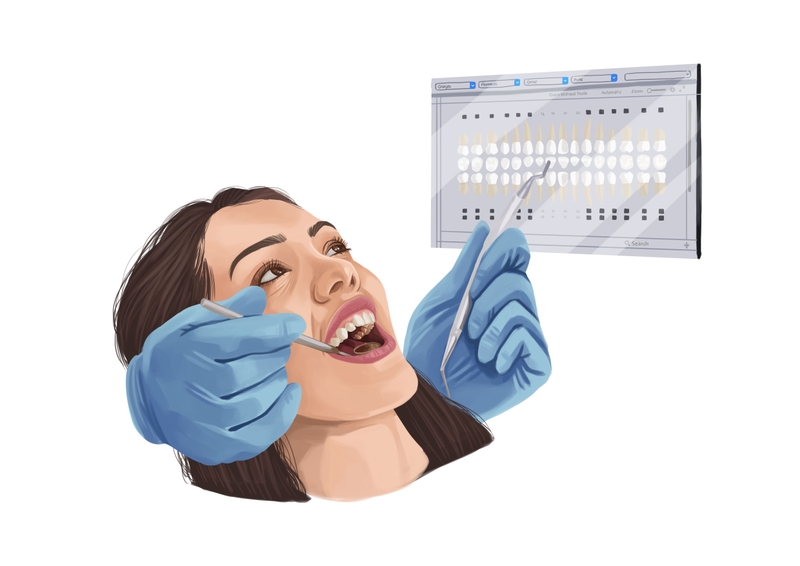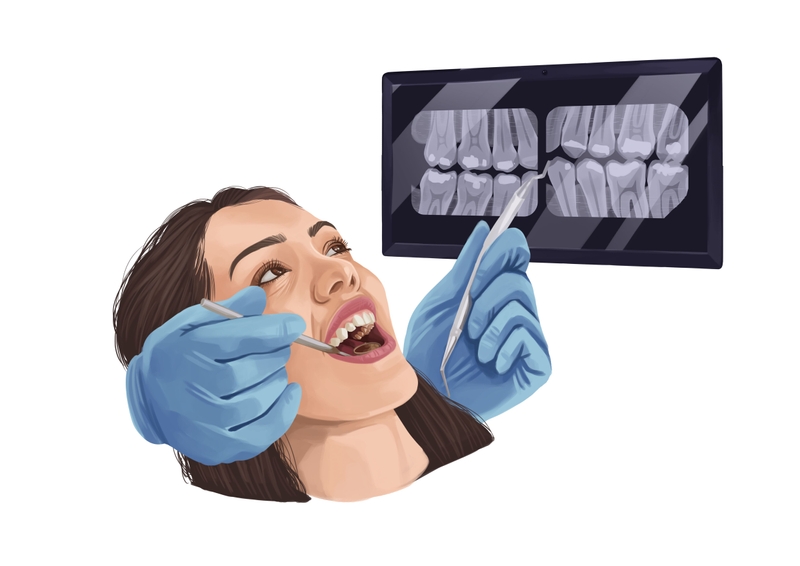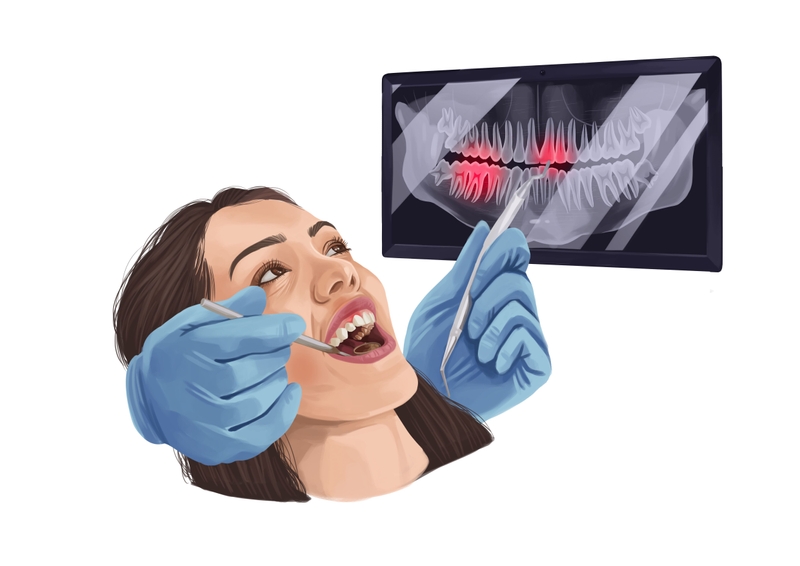- The American Dental Association recommends regular dental examinations twice a year for both adults and children. The regular dental examination is the most common type.
- A comprehensive oral exam is the most thorough type of dental exam. A limited dental exam or emergency exam is for acute oral health problems.
- Prices vary significantly depending on the type of exam and the dental office's location, but the typical cost of a dental exam is about $150.
Feeling tooth pain? Schedule a dentist appointment as fast as possible. Use Authority Dental to find local emergency dentists open now.
Do you need a thorough dental examination? Here's everything you need to know.
Periodic oral evaluation

Picture by Authority Dental under CC 2.0 license
If you visit your dental office regularly, this is the most common procedure you undergo. According to a study by the Delta Dental Plans Association, 58% of Americans have a check-up at least once a year. Such a visit helps ensure you are on top of your oral health.
Periodic exams are conveniently recommended twice a year. This is true for both adults and children.
A dental exam and cleaning is often a single appointment.
What is going to happen?
Your dentist or hygienist will assess the state of your gums, teeth, tongue, throat, cheeks, and lips during an intra-oral examination. He or she will then scale and polish to remove plaque buildup that could lead to gum disease.
X-rays are often taken during this check-up to detect any underlying dental issues. If the dentist has your FMX on file, he or she may recommend only re-taking X-ray images of the posterior teeth.
You will then discuss any necessary treatment. This is a good time to mention that you are considering veneers or dental implants.

When should I schedule a periodic exam?
A periodic exam, as the name suggests, should take place regularly. The ADA recommends one every 6 months. It helps keep things in check and allows you to discuss treatment options with your dentist.
Comprehensive oral evaluation

Picture by Authority Dental under CC 2.0 license
This dental evaluation is the most thorough. If you have not been to the dentist in a long time (or ever), you will probably have a comprehensive exam.
What is going to happen?
This appointment will start with an evaluation of your medical history, a review of any medications you are taking, your habits and diet, and any concerns you may have.
Your teeth, along with all intraoral (inside the mouth), extraoral (outside of the mouth), and soft tissues, will be extensively evaluated. Your dentist will check for cavities and examine your bite.
This is also a good opportunity for dental cleaning and, if necessary, a lesson on oral hygiene. Your mouth will be screened for oral cancer as well. If you have any fillings, bridges, crowns, or a denture, those will be inspected too.
The dentist or a dental hygienist will take X-rays if necessary. He or she may suspect decay between the teeth or abscesses under the gumline, both of which are not visible with the naked eye. A full-mouth series of X-rays (an FMX) may be conducted.

A treatment plan may be devised. You may also pick your dentist’s brain if you have any queries.
Lee warns: "The most critical information we gather is often invisible to the naked eye, which is where X-rays come in. We might take a Comprehensive Exam (which includes a full-mouth series of X-rays) for a new patient to establish a baseline. However, the regular periodic check-up uses bitewings to spot decay forming between teeth."
"These are the 'silent killers' of tooth health, and catching them early saves the patient immense cost and pain down the road," he emphasizes.
When should I schedule a comprehensive exam?
This type of dental examination is often compulsory for new patients. If you are not changing offices, you should not be thinking about a comprehensive exam more often than once every 3 years. That is the ADA recommendation for adults and children aged two and older.
You might need one more often, however, if you suffer from certain conditions or diseases, or if you are a smoker. It is best to discuss your habits and general health with your dentist.
A problem-focused, extensive oral exam follow-up might be needed if you have a systemic disease, prosthetic problems, or TMD.
Limited oral evaluation

Picture by Authority Dental under CC 2.0 license
A limited dental evaluation is often also referred to as an emergency exam. It is meant to visit a dentist with acute oral health problems that cannot wait.
What is going to happen?
The dentist will inspect the problem area or look for it if you are unable to locate the pain. He or she will have a close look at your gums, teeth, tongue, throat, cheeks, and lips. X-rays might be taken to find any issues that are not immediately visible.
If the problem is minor, you might be treated right away. If it is determined that you will need invasive treatment, such as a root canal, you might have to schedule another appointment.
When should I schedule a limited exam?
A limited exam could be appropriate if you have an accident or if you are experiencing sharp pain that will not go away. Since it was designed to address a specific issue, this appointment cannot be scheduled regularly. You should only schedule one if needed.
This could be when a wisdom tooth erupts, after an accident that affected your oral area, or when you are feeling pain and cannot pinpoint precisely what is wrong. Sometimes this kind of pain could indicate an acute infection below the gum line, which should be treated as soon as possible.
Also, go and see your dentist if a filling falls out or if you lose a crown.
Dental exam cost broken down
Dental exam costs near you vary from $50 up to $250. Here is how much you can expect periodic, comprehensive, and problem-focused exams to cost, specifically:
| EXAM TYPE | AVERAGE COST | COST RANGE |
|---|---|---|
| Periodic | $60 | $50-$150 |
| Comprehensive | $100 | $70-$200 |
| Limited | $100 | $70-$200 |
An exam may uncover the need for further treatment. Consider that in your budget. Here are common procedures associated with dental exams:
full-mouth debridement,
dental cleaning,
scaling and root planing,
oral hygiene instructions,
2D oral or facial photos,
panoramic X-rays, and
FMX.

FAQ
Does a dental exam hurt?
No. There is nothing invasive about a dental checkup. In fact, it is one of the few procedures in a dental office that does not even require a local injection or any other numbing agent. The most significant part is visual.
How long does a dental exam take?
What are the most common procedures associated with exams?
X-rays can be conveniently taken during dental examinations. Bitewings, for example, are recommended every year, similarly to a periodic exam. This is the perfect opportunity to avoid unnecessary visits to the dentist.
You can also take advantage of the opportunity to schedule your prophylactic cleaning on the same day.
How often should you visit a dentist?
Does insurance cover dental exams?
Yes. Your dental insurance plan will likely cover the full costs of the exam. They will only reimburse you for two routine oral evaluations per year, however. If you need more, you will be paying out of pocket.
To avoid this inconvenience, we recommend dental plans. They are a great way to save up to 60% on all dental procedures. There is no need to collect documents or to worry about whether treatment is medically necessary. You can also use them when your insurance is capped out for the year.
Is a dental check-up free?
If you are insured, you may receive dental exams with no out-of-pocket costs. You can also check with your local dental school to see whether students are willing to conduct a free dental exam. They need patients to practice on, which gives low-income individuals an excellent opportunity to save.
Henry Hackney, DMD
Visits every 6 months are recommended after initial tooth eruption. Tooth decay is often prevalent in children under six due to nursing, use of bottles, fruit juice intake, etc.